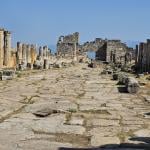Robert Wilken emphasizes the biblically-centered character of early Christian preaching and thought: “Not only in sermons but also in theological works, in letters, and in spiritual writings the church fathers display an enviable verbal command of large sections of the Bible. In contrast to modern theological writings in which the Bible is cited in support of theological ideas, and hence usually relegated to the footnotes, in the early church the words of the Bible were the linguistic skeleton for the exposition of ideas. Even in the writings of the most philosophical of early Christian thinkers their thoughts are expressed in the language of the Bible, seldom above it. The liturgy provided a kind of grammar of Christian speech, a key to how the words of the Bible are to be used.”
One of those philosophically oriented church fathers was Clement of Alexandria. Clement begins his exhortation to the Greeks with citations of famous Greek singers, but soon enough he comes to the point and says that we should “abandon Helicon and Cithaeron and take up a dwelling place in Zion.” Wilken notes that “A rough calculation indicates that on average there are seven or eight biblical citations on every page of his writings. There are more than fifteen hundred references to the Old Testament and close to three thousand to the New Testament. The Gospel of Matthew is cited more than five hundred times, John more than two hundred, the Psalms more than three hundred, the books of Isaiah and Proverbs more than two hundred times.” He admits that “there are MORE references to Greek literature, to Homer, Plato, Aristotle, Euripides, Chryssipus, Plutarch and other Greek authors than to the Bible,” but says that “when he cites the Scriptures there is a sense of discovery, that something extraordinary is to be learned in its pages, that it is not one book among many.”
Not only did the Bible provide the content of patristic theology, but it provided the object of study. Theology was exegesis. Wilken again: “Because the words and images of the Bible endure, they provided scaffolding on which to construct the edifice of Christian thought. The Bible was, however, more than a platform on which to build something else, and biblical interpretation was not a stage on the way to the real work of thinking. Thinking took place through exegesis, and the language of the Bible became the language of Christian thought.” He cites a sermon of Augustine in which Augustine says that Scripture is “God’s face for now.” Searching Scripture was not for informational purposes, but an effort to know the God who had revealed Himself there.
For Origen, the central importance of the Bible arose from the fact that there are analogies between Scripture and the universe. The same Logos that spoke the world into existence has also spoken in Scripture, and we should expect to find some similarities. (This from de Lubac’s History and Spirit. Origen: “Between the history of providence that Scripture recounts and its works that we have before our eyes, there is perfect agreement . . . . Whether one reads Scripture or the intelligent hierarchy of creatures, one sees the same Light of the Logos shine forth.” The gospels are linked to the four elements of the world. They are a world unto themselves.
For Origen (de Lubac says) “Scripture is like another world, built on the model of the first, and if ‘it is a mixture of things visible and invisible,’ that is because the latter is also Does not the apostle Paul tells us that ‘this earthly position contains certain types of heavenly realities, so that, from things below, we are able to ascend to things above and, by means of what we see on earth, perceive and understand what is found in the heavens’? . . . ‘A certain kind of analogous wisdom’ presided, on the one hand, over the creation of the world and, on the other hand, over the writing of scripture; each tangible object, like each letter of the text, ‘has some mark of resemblance that makes it correspond to some hidden reality.’”
What this means is that the habits we develop in reading Scripture – recognizing the significance of the words and the things to which they refer – enables us to read the world rightly. Not just that the Bible provides a system of ideas that we can use as a screen through which to view creation. The habits of textual and of creation interpretation are the same. The world also requires exegesis. De Lubac: “Minerals, plants, animals are so many symbols. But most men, thinking they see all those things, in reality do not see them. Like the blind Jews reading Scripture, they do not understand the universe. Only the just and the saints have an understanding of it, those who are illuminated by Wisdom . . . . Everywhere in the book of Nature as in the book of the law shine the ‘logoi,’ more or less luminous rays of the same light that emanated from the Logos.”
This Origenist viewpoint was “orchestrated” in Augustine, who spoke of the Bible as the book given to man to read the first book, creation, rightly: “The heavens sang the glory of God. They sing it still, but their sound is no longer perceptible to our carnal ears: Scripture will be for us a second firmament, and this book of the re-creation, received through faith, will make the understanding of the first creation possible for us.” Credo ut intelligam first means “believe in the ‘prophecy,’ accept the Word of God manifested in history, and the whole divine work will again be clear to you and will lead you to God.”











